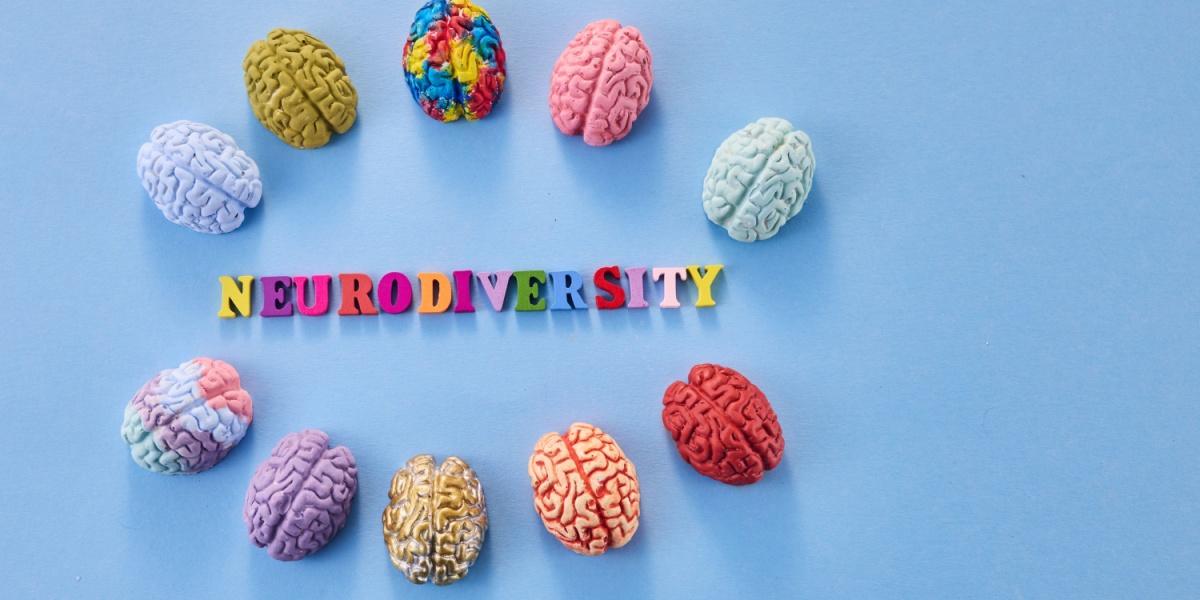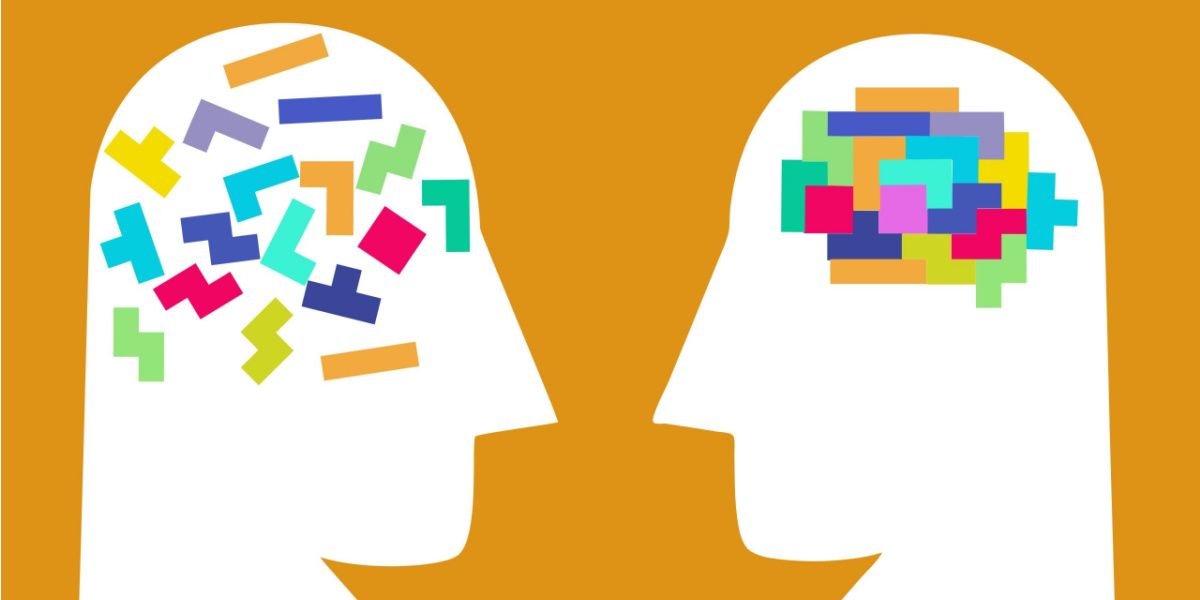Neurodiversity is an umbrella term that includes a range of conditions and symptoms and refers to the uniqueness and variety found in each person’s brain, way of thinking, and way of viewing the world. Neurodivergent people might experience many strengths that can be nurtured and enhanced, and challenges that can be managed with therapies, medications, or environmental adaptations.
- Neurodivergent individuals may process information, focus, or interact differently due to underlying neurological traits.
- Neurodiversity is not a disorder itself but includes conditions that may require support or adaptations.
- Recognizing these differences allows for better support in professional, educational, and personal settings.

Neurodiversity definition
Neurodiversity is an umbrella term that, put simply, refers to differences in brain functioning and a spectrum or range of abilities. The opposite of neurodiversity is ‘neurotypical’, which refers to people whose brain functions and behaviors are within typical expectations or societal norms. [1]
The experiences and functioning of neurodivergent people differ significantly from person to person, as well as from neurotypical people. Each neurodivergent person has their own strengths and weaknesses, as is the case with anyone, which can be linked to the way they interpret the environment, think, or behave. [2]
Where does the term "neurodiversity" come from?
Neurodiversity is a term that was coined in 1998 by Australian sociologist Judy Singer. She created this term to refer to the uniqueness and differences between all brains, recognizing the diversity among all people. She also coined the term with the intention to help fight stigma and change attitudes toward autism, and help all neurodivergent people feel accepted. [3]
Why is the term used?
The term is used to help recognize the differences between neurotypical and neurodiverse people in terms of their behaviors, thinking, and needs. [4]
Many neurodivergent people struggle with certain aspects of their brain functioning while also experiencing a range of positive aspects. Using the term neurodivergent helps to recognize the whole person, as opposed to only identifying their difficulties or defining them by a disorder, allowing them to focus on their strengths. [3]
For example, some neurodivergent people are very creative, hyper-focused, or can consider novel perspectives. Rather than focusing on the difficulties faced within this group, the neurodiversity movement helps bring attention to and nurture these areas of interest and ability.
Is neurodiversity a disability?
Some neurodiverse people have recognized disabilities with diagnosed conditions. They may require aspects of their life, school, or work to be adapted to meet their needs, which can be accommodated by educators and employers. Neurodiversity itself is not a recognized condition or disability, although conditions under this umbrella term can be.
Conditions associated with neurodiversity
Neurodiversity can include a range of conditions, including: [1][2][5]
- Autism spectrum disorder (ASD)
- Attention-deficit/hyperactivity disorder (ADHD)
- Dyslexia
- Dyspraxia
- Dyscalculia
- Down syndrome
- Tourette syndrome
- Prader-Willi syndrome
- Learning difficulties
- Mental health conditions, including obsessive-compulsive disorder (OCD), social anxiety disorder, and bipolar disorder
What causes neurodiversity?
Neurodiversity is not caused by any one factor, but is related to brain development and functioning. Many neurodivergent conditions, such as ADHD and ASD, are related to childhood brain development, which can be influenced by genetic and environmental factors. [1][6]
Many aspects and conditions of neurodivergence have been linked to genes and hereditary traits. Additionally, environmental factors can impact the development of neurodivergence, such as prenatal exposure to toxins, infection, or substance use, low birth weight, or childhood trauma and interpersonal experiences. [6]
Are there symptoms?
Neurodiversity includes multiple conditions, so there is no specific list of signs and symptoms that can be recognized as neurodivergent. Often, neurodivergent conditions involve symptoms related to social functioning, focus and concentration, and the ability to process and understand information. [1]
For example, symptoms that may be seen within neurodivergent people might be linked to: [1][4]
- Sensory processing: Some people might struggle to process sensory information or feel uncomfortable in certain circumstances, such as due to loud noises, the feel of certain fabrics, or personal space or touch.
- Information processing: The way communication and instructions are understood might differ. Certain types of information might be easily misunderstood, such as mathematics or language.
- Social etiquette: ‘Normal’ social behaviors or rules might be unclear or unintentionally unadhered to.
- Focus: Some people struggle to maintain focus and concentration, while others may become hyper-focused on a certain topic or task.
Neurodiversity in context
Neurodivergent people might experience different types of barriers or challenges within certain contexts. Often, these can be managed with specific adaptations to the environment, expectations, or communication. Additionally, neurodivergence can provide benefits or attributes to certain contexts.
Neurodiversity in the workplace
Neurodivergent people might find issues with some of the traditional expectations of the workplace, such as time management, completing tasks, customer-facing roles, or uniforms. Because of the Americans with Disabilities Act, employers cannot discriminate against neurodivergent people and may be required to make accommodations to the workplace environment.
For example, neurodivergent people might benefit from: [4]
- Quiet spaces to work or take a break
- Written instructions for tasks, broken down into individual steps
- Clear scheduling and planning around meetings and deadlines
- Employee training around neurodiversity and communication
- Regular reviews to discuss the individual’s needs and preferences
Also, employers might benefit from the individual’s specific skills and attributes. The neurodivergent person might have a different approach to a project or challenge, be highly creative or intellectual, or have a specific set of skills or knowledge in a certain area. [1][3]
Neurodiversity in education
Neurodivergent people might face similar barriers within the education system, relating to their ability to behave or think in a typically expected manner. Schools can provide the environment and support required for each student to learn. This might include: [7]
- Being aware of stigma and bullying that might occur, and encouraging inclusivity and understanding
- Providing one-to-one sessions to ensure lessons have been understood or to go over complex topics
- Recognizing the strategies and approaches to teaching that work well for neurodivergent individuals
- Adapting the sensory aspects of the classroom, such as noise, colors, or lighting
- Being clear about the expectations of the students within the classroom and how neurodivergent individuals can meet these expectations with necessary accommodations
- Helping students to identify their strengths and interests, and encouraging these areas
Neurodiversity and healthcare
Neurodiversity can impact the quality of healthcare that is received for several reasons, such as communication issues, anxiety, and sensory overstimulation in places such as waiting rooms. These issues might prevent neurodivergent individuals from attempting to access healthcare, communicating their health problems adequately, or being understood by professionals. [8][9]
Neurodivergent people might benefit from: [8][9]
- A friend or family member attending appointments to help communicate issues and listen to the healthcare professional’s advice
- Waiting rooms with less noise or lighting
- Items such as noise-cancelling headphones or weighted blankets in clinics and hospitals
- Clinician training and understanding about neurodivergence and specific healthcare needs
Neurodiversity and relationships
Neurodivergent people's needs, behaviors, and communication styles can impact their interpersonal relationships. They may also experience stigma and judgment from others, further impacting their ability to develop meaningful relationships and friendships. [10]
Depending on the individual, neurodivergent people might benefit from: [10]
- Being clear about their physical boundaries
- Addressing any issues they may have with communication, and developing strategies with friends or partners around how to speak with and understand one another
- Attending support groups or communal activities with other people with similar symptoms or conditions to feel a sense of community and understanding
- Avoiding situations or events that may be overwhelming or difficult
Additional resources for understanding neurodiversity
Educators and employers can engage in training, workshops, or seminars to improve their ability to support neurodivergent students and employees. Examples of this include:
- The EW Group Neurodiversity Training at Work
- ADHD Foundation Neurodiversity in the Workplace information guide
- Achieve Centre Neurodiversity at Work training
- Nottingham Business School Exploring Neurodiversity in the Workplace three-week course
- Neurodiversity Education Academy Training, tools, and resources for schools, families, and businesses
- British Dyslexia Association Teaching for Neurodiversity webinar training
- Get Into Neurodiversity Courses and toolkits
Assistance for neurodivergent people
Neurodivergent people might wish to seek support to help in the workplace, school, or other settings. Online forums and websites can be a good place to look, particularly for those who struggle with social interactions. For example:
- Neurodiversity Hub
- Neurodiversity Network
- Association for Autism and Neurodiversity
- Society for Neurodiversity
For professional advice and support, people can consult a healthcare professional or a specialist, who can refer to appropriate services, guide individuals with workplace or education needs, or prescribe treatments.



-guide-detail.jpg?v=1743497813)
-(1)-guide-detail.jpg?v=1722502701)